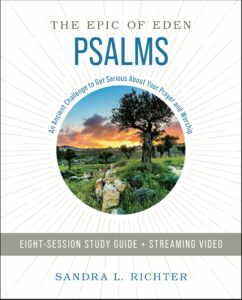It is indeed true that the Fall has made our world Adam’s world—with all of the sin and sickness and violence birthed from Adam’s rebellion. Therefore “bad” is now built into this profoundly distorted world of ours and violence, poverty, birth defects, and abuse happens. All the time. But for those who have bent the knee to the King of Heaven, our suffering is never meaningless. Not only will we will one day be delivered of this present suffering, but our God has promised to weave every thread of our life experience into the tapestry of his plan. More staggering to me is that the essence of the “God with us” promise of the Gospel is that our God actually accompanies us through every moment of our present agony. Yes, “In this world you will have trouble. But take heart! I have overcome the world” (John 16:33).
1 My God, my God, why have you forsaken me?
Why are you so far from saving me,
so far from my cries of anguish?
2 My God, I cry out by day, but you do not answer,
by night, but I find no rest.
3 Yet you are enthroned as the Holy One;
you are the one Israel praises.
4 In you our ancestors put their trust;
they trusted and you delivered them.
5 To you they cried out and were saved;
in you they trusted and were not put to shame.
(Psalm 22:1–5 )
Now read Mark 15:1, 15–39. Was Jesus’s choice of Psalm 22 as his final words another nod to the fact that he was the son of David, the rightful heir to the throne? Or was it more his identification with all of us who have known betrayal, abandonment, humiliation, dehumanization, injustice, collusion, lynching, rape? As we watch Jesus die—stripped, beaten, humiliated—we watch a faithful servant of the Most High in agony. Agony he does not deserve, inflicted by the systemic injustice of a brutal empire, tolerated by a religious elite more concerned with maintaining power than exercising justice. And we can hear in his words that he is also grappling with despair: “Why are you so far from saving me, so far from my cries of anguish?” (v. 1). If ever there was a man who should not have suffered, this is the man. If there was ever a man falsely accused, this is the man. But his innocence changes nothing about his suffering. What it does change . . . is us. You see in the midst of his anguish, Jesus models to us how to not simply endure evil, but to triumph over it. And the darkest moment of his life is transformed into greatest victory.
Now I realize that Jesus is God and the crucifixion can never be duplicated. But please hear again how Jesus deals with his agony. “In you our ancestors put their trust; they trusted and you delivered them. To you they cried out and were saved; in you they trusted and were not put to shame” (Ps 22:4–5). In his blackest night, David’s heir, the true king of Israel, our elder brother and the firstborn from the Dead, models to us how to navigate the agonies of this life. He prays. To a God who had proved he would not fail. Jesus declares his unending confidence in a God who seems far off. And in his weakest hour, Jesus leans on the faith of those who have gone before. Jesus lets the ancients pray for him.
What are you facing these days? An injury of the past so severe that you just can’t find your way out of the darkness? Betrayal and abandonment, perhaps by the one who promised to “love and cherish until death do us part”? False accusation? Injustice that will not let you up or out? Be comforted, my friend, and set your lens. The kingdom of this world is passing away, and the King of our souls has walked these paths ahead of us . . . and he found strength in the psalms.
—
 Did you enjoy this entry? It’s an excerpt from Sandra Richter’s latest Bible study, Epic of Eden: Psalms. Epic of Eden brings our ancestors in the faith to the table where we learn from them in a cross-cultural experience bridging historical and modern day life. This eight-session study of the Book of Psalms masterfully mixes scholarly and practical teaching through the most-known wisdom Book of the Bible.
Did you enjoy this entry? It’s an excerpt from Sandra Richter’s latest Bible study, Epic of Eden: Psalms. Epic of Eden brings our ancestors in the faith to the table where we learn from them in a cross-cultural experience bridging historical and modern day life. This eight-session study of the Book of Psalms masterfully mixes scholarly and practical teaching through the most-known wisdom Book of the Bible.
Experience the Psalms with fresh connections to contemporary worship and devotional practices. Indulge in the biblical study of the Psalms from a scholar and former pastor. Letting Sandra do the “heavy lifting” of research and translation allows you to experience the Bible in a deeply sensitive way, answering the evergreen question, “so what does this have to do with me today?”



